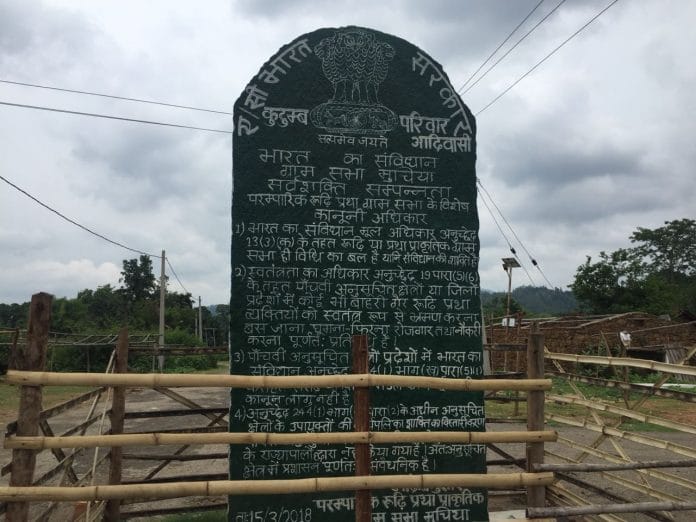Pathalgarhi supporters say nobody linked to their movement had any role in the gang rape of 5 NGO workers as claimed by police.
Khunti, Jharkhand: Nestled between expansive green pastures and hills, the Kochang village in Jharkhand — about 100 km from capital Ranchi — where five NGO workers were allegedly gang raped last week, bears little evidence of political activity. The only exceptions are the giant green plaques in the village declaring it a “prohibited” area for “outsiders”.
These plaques have been erected as part of the Pathalgarhi, also called Pathargarhi movement — a tribal rebellion simmering in the dense forests of Jharkhand for over a year.
Over the past one week, the movement has been in the news for the alleged involvement of its supporters in the gang rape of the five activists, who had come to perform a street play in the Kochang village.
The police claim that the gang rape could be a way of imposing a “penalty” on the five “outsiders” by the Pathalgarhi supporters for their alleged transgression of entering a prohibited area.
But those involved in the movement dismiss this claim, saying it is police’s ploy to launch an offensive against them.
What is Pathalgarhi?
The Pathalgarhi movement considers a gram sabha as an autonomous unit. It seeks to challenge the right of the Indian state to govern tribal areas without violating the law.
According to the Provisions of the Panchayats (Extension to Scheduled Areas) Act, 1996 or PESA, gram sabhas in the scheduled areas of the country are entitled to self-governance since these areas were not covered by the 73rd Constitutional Amendment or Panchayati Raj Act of the Constitution.
“The Pathalgarhis invoke the parts of Indian law and the Constitution which grant us the right to govern ourselves,” says Sushma, a local activist.
“If the state will not believe in its own laws, then who will?” she asks.
Pathalgarhi or Pathargarhi derives its name from rocks or stones used by locals to demarcate a tribal territory, where the gram panchayat reigns supreme.
“We have our own laws and customs and unless there is a case of murder, rape or robbery, the state administration cannot intervene. Even then, only if the gram sabha agrees, can the state officials intervene,” says Sushma.
The movement has its origin in a tribal custom of erecting stones at the burial place of the dead.
‘How can the state tolerate this?’
The supporters claim that the movement was triggered by the Jharkhand government’s alleged attempt to acquire tribal land for “development”. In 2016, the BJP government in the state had passed amendments to two laws that guard tribal tenancy rights.
While the two amendments were stalled in the face of severe criticism from tribal groups and the opposition, the Right to Fair Compensation and Transparency in Land Acquisition, Rehabilitation and Resettlement Act 2013 (Jharkhand Amendment) Bill, which is awaiting the assent of the governor and President, may be another, more dangerous attempt by the government to acquire their land, tribals worry.
However, the state administration views the tribal rebellion as “anti-state”, stressing the need to curb it.
“After the forces made some Maoists to surrender, there was a vacuum in the Khunti area…So these Pathalgarhis came, but they are hand in glove with the People’s Liberation Front of India (PLFI),” a district official who did not wish to be named said.
PLFI is a splinter group of the CPI (Maoist), which has its presence in many states including Jharkhand and Chhattisgarh.
“They want to have their own currency, own bank, own law…They have completely distorted the idea of gram sabhas. How can we allow this?” the official said. “They do not even let government officials enter their village, but they take ration from us.”
Supporters of the movement, however, deny any link with the PLFI, saying this conflation between Naxals and Pathalgarhi is a deliberate attempt by the government to implicate them.






